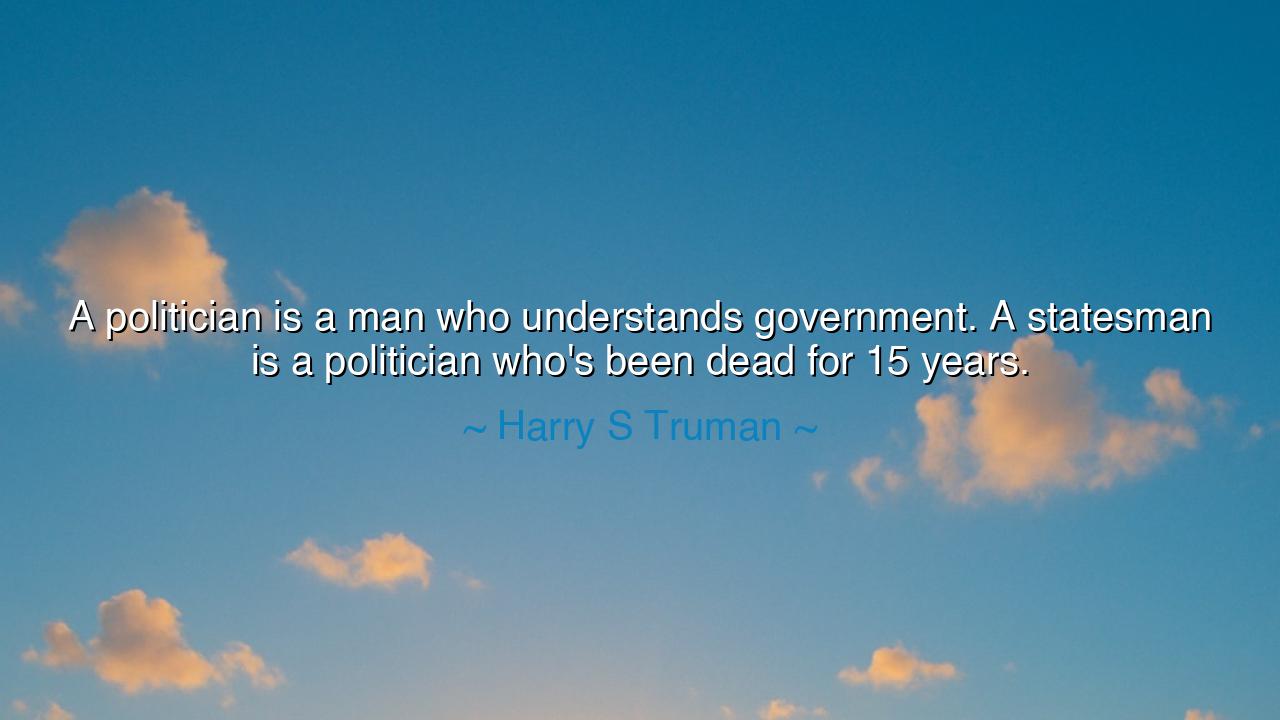
A politician is a man who understands government. A statesman is
A politician is a man who understands government. A statesman is a politician who's been dead for 15 years.






"A politician is a man who understands government. A statesman is a politician who's been dead for 15 years." – Harry S. Truman
In this sharp and memorable quip, Harry S. Truman, the 33rd President of the United States, distills with humor a truth as old as politics itself. On the surface, his words draw laughter—but beneath the jest lies deep wisdom. When he says that “a politician understands government” but “a statesman is a politician who’s been dead for 15 years,” Truman exposes the fickle nature of public opinion and the distance between political reality and historical judgment. The line is a reflection not only on how leaders are perceived in their lifetimes, but on the long journey from criticism to reverence that history demands. For in life, every politician is contested; in death, their intentions are purified, and time reveals the true worth of their deeds.
The origin of this quote arises from Truman’s own experience in the fires of leadership. As a man of plain speech and moral fortitude, he knew what it meant to bear the weight of decision-making amid misunderstanding. During his presidency, he faced fierce opposition and ridicule—whether for authorizing the atomic bomb, desegregating the military, or defending South Korea in the war against communism. His choices were divisive, and in his own time, he left office deeply unpopular. Yet years later, history would vindicate many of his actions, and Truman, once dismissed as an ordinary party man, would be celebrated as a statesman of courage and conviction. Thus his quote, delivered with wry humor, was also born of humility: he knew that greatness is seldom recognized in its own hour.
Beneath the laughter, Truman’s words reveal an eternal contrast between the politician and the statesman. The politician navigates the present—he bargains, persuades, and contends with the tides of opinion. The statesman, by contrast, serves the future—he sees beyond his own time and acts not for applause, but for the enduring good. Yet, as Truman observed, it is often only after death, when the noise of partisanship has faded, that the statesman is truly seen for what he was. The passage of years strips away propaganda and prejudice, leaving only the enduring marks of character and consequence. What was once called stubbornness becomes conviction; what was called folly becomes foresight.
History abounds with examples of Truman’s wisdom. Consider Abraham Lincoln, who was despised by half the nation during his presidency. His policies were derided, his leadership mocked, his very voice ridiculed in the papers. Yet, fifteen years after his death, his name had become sacred—his vision for unity and equality recognized as divine. So it is with many leaders: Churchill, scorned and dismissed after the war he helped win; Thomas Jefferson, condemned and praised in equal measure; and Truman himself, whose legacy grew brighter with every passing decade. The world forgets that the statesman must live the life of a lightning rod—absorbing hatred in his day so that his nation may stand unbroken tomorrow.
Truman’s humor hides a melancholy truth: that the work of leadership is a lonely labor. The politician must make choices that displease the present to preserve the future. He must walk the line between moral courage and political ruin. The people may not understand him; his allies may desert him; and yet he must act. For every decision that is remembered as wisdom, there are a thousand that are cursed as error. Only when time has mellowed the passions of the moment can the full measure of a man’s service be taken. And by then, as Truman wryly noted, the statesman himself has long been laid to rest.
But Truman’s remark is not cynical—it is profoundly hopeful. It reminds us that truth is patient. The judgment of history, unlike the roar of the crowd, is measured and just. It teaches us to look beyond the slogans of the day and the battles of the hour, to ask not who is loved now, but who acts rightly despite the cost. For every generation, the call is the same: to raise leaders who think not of the next election, but of the next century. And for citizens, the duty is to see beyond partisanship—to recognize that the mark of a true statesman lies not in his popularity, but in his steadfastness of purpose.
The lesson of Truman’s words is timeless: do not be deceived by the noise of the moment. Greatness is often cloaked in controversy, and truth may take decades to reveal itself. A politician may serve his ambition, but a statesman serves his conscience, and though he may die unloved, he will live forever in the memory of his nation. So let us honor the living not only when they are gone, but when they stand, weary and alone, making the hard choices that keep the fabric of liberty intact. For as Truman reminds us with a smile and a sigh—every statesman was once just a politician, misunderstood in his own time, but remembered as the guardian of his people’s future.






AAdministratorAdministrator
Welcome, honored guests. Please leave a comment, we will respond soon